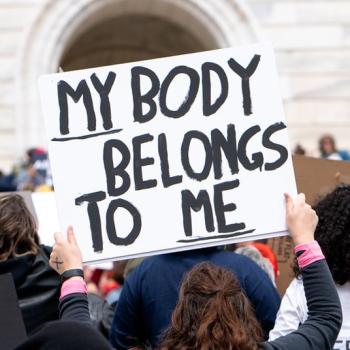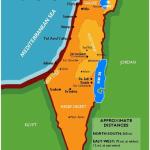By now, most of us have heard of the current Israeli/Palestinian conflict launched on October 7, 2023. In this recent attack, a group of Palestinian militant organizations launched a series of strategic and planned attacks on Israel, led by Hamas. This conflict is now known as the 2023 Israel-Hamas war. As of the writing of this article, approximately 1,400 Israelis and 2,750 Palestinians have been killed in the ongoing conflict. These attacks first took place during the Jewish holiday Simchat Torah (the end of the annual cycle of Torah readings) and a day after the fiftieth anniversary of the Yom Kippur War. A particularly ugly image of war, Hamas attacked a music festival, took unarmed civilians to the Gaza strip, and Israel retaliated, declaring war on Hamas. The attacks were a statement against the Egypt/Israeli blockade of the Gaza Strip which severely destroyed their economy.

With Americans falling on all sides of the Israeli/Palestinian conflict, is support for Israel a matter of Biblical understanding, or something else? What backstory do media reports and social media posts fail to tell? Here we will examine ten different things to know about the Israeli/Palestinian conflict, offering perspective for anyone who might be interested.
1. Modern-day Israel is not Biblical Israel
As we understand it today, the nation of Israel did not exist until after the Second World War. Beginning in the late nineteenth century, Jews started buying Palestinian properties in response to Zionism (we will discuss Zionism a little later). After World War I, what is now Israel was under British rule (covering Palestine and Transjordan). British presence in the area caused tension between the Jews and Arabs. After World War II, Britain couldn’t support its various occupations across the world and terminated their rule in Palestine in 1948. A year earlier, the United Nations approved a partition plan that started a civil war between the Arabs and Jews. Ever since, the two have been in constant conflict: both with one another and surrounding Arab neighbors.
There are two major disputes: First, that Israel controls more than one-third of the territory promised by partition plan. Second, the failure to create an independent Palestinian state. Throughout the years there have been subsequent wars over territory, including the 1967 Six-Day War. This conflict tripled the territory under Israel’s control and the Israeli occupation of the West bank and Gaza strip. Despite numerous attempts at peace, neither Israel nor Palestine have found much in over fifty years.
To favor modern-day Israel isn’t a Biblical issue. Biblical Israel has not existed since 722 BC. The creation of this state was a political entity, not a spiritual one. Through a number of years and the changing of hands between various nations, the current Israeli government does not uphold Biblical principles for governance and treatment of non-citizens within its regulations of the Palestinian people.
2. …Not even Biblical Israel got away with every administrative decision
Before you argue the Biblical nature of the state of modern Israel, I think it’s important to note that Biblical Israel was held to certain standards in governance. Leaders were expected to honor the treaties they made (Genesis 26:28, Joshua 9:15, 1 Kings 5;12, 1 Kings 20:34, 2 Kings 15:19, Ezekiel 17:13-18) (this is why they were urged not to make treaties with surrounding nations) as well as care for the “foreigner” living in their land (Leviticus 19:33-34,Deuteronomy 23:7, Deuteronomy 27:19). (One could argue the Palestinians and their descendants were in the land first; but for the sake of this point, we are considering Israeli rule.) Rulers were forbidden to act wickedly (Proverbs 16:12, Proverbs 29:12). They were to rule with justice and righteousness. Being “Israel” wasn’t an excuse to govern any which way they pleased. If anything, God held Biblical Israel to a higher standard than other nations.
If modern Israel existed in Biblical times, God would have denounced their actions against the Palestinian people. They would be reminded of their years in occupation and avoid corruption of power.
3. Zionism is not specifically a Jewish idea
Zionism is the belief that a Jewish state should exist in (what was) the state of Palestine. Today, Zionists support the existence and protection of the Jewish state of Israel. Many are surprised to learn the movement originated in the late nineteenth century by secular, rather than religious Jews (we will speak on this next). Theodor Herzl (1860-1904) spearheaded the movement after experiencing the sting of European antisemitism, prevalent at that point in history. He believed it was impossible for Jews to assimilate into any society other than their own, thus an independently governed Jewish state was a political requirement. As a result, European Jews were encouraged to relocate to Palestine. Politically, this was not an official proposition. The original proposition was the creation of a Jewish state in British East Africa. This idea failed, the focus returned to Palestine, and Herzl died before modern Israel was founded.
Christian Zionism
Zionism gained particular support from a growing evangelical subset known as dispensationalism. Dispensationalists believe history is divided into specific eras, known as dispensations, by which God deals with humanity. Without getting into a discourse on the beliefs of dispensationalism, one of them is that for Jesus to return, Israel has to be under Jewish rule. Both supporting their own doctrinal advancement and the prevalent British antisemitism of their day, Christian Zionism became a powerful – and influential force – in the political push to create a Jewish state.
Today, Christian Zionism extends beyond the boundaries of dispensationalism. It is found among different denominations (especially evangelicals) as a loud – and resounding figure in the continuation of Zionist ideals. Based in a specific understanding of Biblical prophecy that’s not accepted by all Christians, Christian Zionists are often the most vocal supporters of all things related to the modern state of Israel. In defense of their ideas, they tend to overlook the moral implications and missteps of modern Israel’s governance.
4. Not all Jewish people support Zionism
In the pursuit of Christian Zionism, most Americans poorly understand Judaism. It’s a misnomer to say modern Judaism is all one thing. There are three main branches of Judaism with a number of subheadings and smaller sects. All have their own unique traditions, understandings, and yes, interpretations of Jewish eschatology. As a result, not all Jews support the establishment of the modern state of Israel.
Some believe Israel will not return to the Promised Land until after the Messiah appears, leading them into it himself. Others feel a Palestinian state should exist alongside Israel. Some still believe in the state of Israel, but do not support its actions. There are other Jews who believe that, due to Biblical prophecies, they should exist under the governance of other nations. To say supporting Israel equates to supporting Judaism is, in fact, incorrect. Just as all individuals of other religions don’t agree about everything, not all Jews agree about the issue of the state of Israel.
5. Israel isn’t innocent in this conflict
While Christian Zionists paint the picture of a persecuted Israel with “right” to the land, the realities of Israel’s occupation of Palestine paint a far different picture. Whether we like it or not, politics don’t function as they did in Biblical times. We are past the days where a nation can be occupied by “right” without raising concern of native citizens. And while the most recent conflict makes it sound like Palestinian militants are waiting in the wings to cause trouble on an otherwise suspecting peaceful nation, the truth is far more complicated than it appears. For example:
- The occupation of Palestine has been ongoing since 1967, making it the longest occupation in modern history
- Israel has implemented a blockade of the Gaza strip since 2007, devastating the Palestinian economy
- The life expectancy among male Palestinians is ten years lower than it is for Israeli men; there is an eight-year disparity for women
- Palestinians face an unemployment rate of 25.7% versus Israel, whose rate is 3.4%
- The average annual income is $54,650 (US dollars) for Israelis versus $4,610 for Palestinians
- Israel controls Palestine’s water supply, thus causing severe shortages
According to an article by The Global Centre for the Responsibility to Protect, “Palestinians are regularly subjected to violence by Israeli settlers, including physical attacks, shooting with live ammunition, torching of fields and livestock, theft and vandalization of property. Israeli security forces also perpetrate widespread attacks against Palestinians, particularly in occupied territory, which often lead to deadly escalations, including regular aerial bombardments of the Gaza Strip.” It may not make the news, but Israel is definitely an aggressor in this conflict.
6. …and neither is Palestine
I definitely agree Israel is both the aggressor and guilty of numerous violations in this conflict. I also know that war is an ugly facet of life and innocent people suffer in the crossfire. The rise of extremist organizations, such as Hamas (the Islamic Resistance Movement), in light of the Palestinian occupation hasn’t helped illicit sympathy or understanding for their plight. While there is certain reason to form defense, there’s also something to be said for negotiating and fighting for established land boundaries rather than killing, raping, kidnapping, and holding innocent civilians hostage. Somewhere, some way, the hostility has to cease.
I’m not a politician and I don’t have a good answer for how to accomplish this. I do know, however, that even the Qur’an states the following: Fight in the way of Allah against those who fight against you and do not be aggressive. Surely Allah does not love aggressors. (2:190) Perhaps there is a better, more moral approach to this conflict than violating the lives and personage of innocent people.
7. As with all politics, various nations fall on different sides
Out of 192 member nations, 139 of United Nations’ members recognize Palestine as an independent state. Among the G20, nine member nations recognize Palestine’s autonomy (Argentina, Brazil, China, India, Indonesia, Russia, Saudi Arabia, South Africa, and Turkey), while ten do not. Among the ten that do not are the United States and Britain. When it comes to the Israeli/Palestinian conflict, there is even more dispute and disagreement over taking sides. While politicians worldwide may have opinions, most individuals don’t actively side in the conflict.
8. There are easy answers, but complicated solutions
There are two solutions to the Israeli/Palestinian conflict that are extremely simple. The first is for Israel to honor the UN treaty. The second, related to it, is for Palestine to come out from occupation and hold its own sovereign state. The complicated solution would require Israel to surrender its overstepped territory and acknowledge a nation they despise. Despite a number of attempted peace treaties, Israel deliberately blocks UN fact-finding missions in attempt to discover possible compromises. The more Israel fails to cooperate, the more Palestinians plot retaliation. For a practical solution, both would have to literally cease fire.
Unfortunately, there is no sign of this happening. Even if the two can reach a peace agreement, history bespeaks it won’t last long.
9. Conflict is a way of life
The ugliness of war demands the Israelis and Palestinians live with conflict on a daily basis. Palestinian occupation takes the form of checkpoints, lack of economic trade, inability to work, and constant fear of attack. There are people who have not seen members of their families in decades due to the conflict. Individuals run through underground tunnels to access food and supplies. Both sides face persecution and mixed marriages face impossibility. Populations of ethnic minorities in the region: Samaritans, Circassians, Druze all face uncertain futures as their numbers dwindle in conflict. Palestinian Christians go ignored as Christian Zionists embrace politics over their spiritual brethren.
Behind the Israeli/Palestinian conflict are people: people trying to live. People suffering. Loss of life, family members, and friends. Antisemitism and anti-Muslim sentiment run at a fever pitch. The level of inconvenience and heartache with which these people live is unfathomable to us.
10. It is wise for us to examine our own perspectives
The Israeli/Palestinian conflict is not a spiritual battle; it is a land dispute. God didn’t instruct anyone to take over Israel because Britain ran out of money. Modern Israel does not receive guidance from a central prophet or spiritual leaders. In fact, somewhere around 45% of Israeli Jews are either not practicing or identify as secular (I have heard of higher numbers for those identifying as atheist). There’s no Biblical battle here. Biblical injunctions related to Biblical Israel don’t apply. This nation does not exist under the same circumstances as one which did, with the same name, in Biblical times.
We should beware the idea of an “unconditional” politics. No one, and no nation, is untouchable. Even Biblical Israel faced this fact: yes, they received land, but their own mismanagement of it and its people caused them to falter in covenant. As a result, they lost the land. In Scripture, God often used different nations to implement a sense of divine judgment, even when it’s uncomfortable. Will this happen to Israel today? Like I said earlier, today’s governmental system doesn’t play by the same rules as old. Therefore, the conflict that exists demands a modern solution.
As Christians, our own biases hurt our witness. We flip over a woman in a burqa but think an Orthodox Jewish woman’s headscarf or wig is perfectly all right. They are all worn for similar reasons, but we regard the context very differently. Politics cloud our judgment; they keep us from seeing justice and injustice. Just because a nation has a Biblical name does not mean it espouses Biblical virtue. Better for us to remember that we need God in our world as much today as yesterday, rather than siding with a nation that has now rose to become the oppressor.
Conclusion: Psalm 122:6-9
Pray for the peace of Jerusalem: “May those who love you be secure.
May there be peace within your walls and security within your citadels.”
For the sake of my family and friends, I will say, “Peace be within you.”
For the sake of the house of the Lord our God, I will seek your prosperity. (NIV)


















